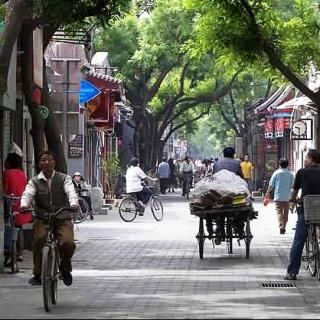
介绍:
20160706 一中两外锵锵三人行
今日话题: 北京的胡同儿, 是应该好好地保护呢?还是让它顺其自然的消失呢?
Lincoln: Is Beijing becoming more and more gentrified? There have been a lot of articles about this and we often hear about hutongs that have been demolished for the sake of modernity and the for the sake of moving forward. There’s an interesting article that came out in the Observer recently. Brian what do you think?
Brian: Gentrification: in some ways I think this is a sign China is modernizing and joining other more developed countries in seeing this. Coming from the United States you see a lot for gentrification in big cities there, but I don’t think I’ve heard about it often in China so you could say that this is a step forward but probably not for the residents who originally live there at least.
Lincoln: Just to give clarification for the listens; Gentrification is a trend in urban neighborhoods, which results in increased property values and the displacing of lower-income families and small businesses. So it’s not something that is desirable but it is very often a necessary by-product of progress.
Shaowen: Last weekend me and my wife went to a Hutong to the West of the Forbidden City, where she used to live with her grandparents. She was sort of disappointed with how things have changed. I asked her two questions; are you wiling to move back don’t think about costs or anything else. She said no. Second question; when you have a choice to move out twenty or thirty years ago, would you choose to stay or to go, like Brexit! She said definitely. She may struggle with herself but in the end she would move. So that kind of change is based on mutual adaptation based on actively choosing to change or by passive adaptation because of an increase of so-called ‘aliens’. By ‘aliens’ I don’t just mean people who did not used to be hutong residents but people who are from other cities or from other countries. So even if you wanted to restore that culture it’s no longer there, it’s a mixture. [It’s] Multi-ethnic or multi-cultural. Now they are providing many services for those residents who want to improve their lives. For example those Behai or Sichihai, those areas are providing so-called bars or pubs, but actually life-like bars is not typical of hutong culture. It’s actually the tea-house culture that is more relevant.
Brian: Behai is a perfect example because its a kind of a very cool place to go to, its not as hip and trendy as other places, but it’s a place for young people to go to.
Shaowen: We can call it Beijing today but not Beijing from 50 days ago.
Brian: Absolutely, and maybe we can say that it has changed for the better but maybe its not.
大家还在听

